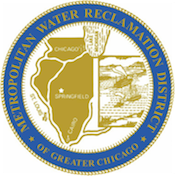Metropolitan Water Reclamation District of Greater Chicago
Principal Environmental Scientist (#20003684)
General Statement
Under general direction, carries out or supervises applied research projects of varied scope in relation to wastewater treatment processes and oversees environmental monitoring activities.
Essential Job Functions
Essential job functions are fundamental, core functions common to positions in a classification. They are not intended to be an exhaustive list of all job duties for any one position in the class. Since class specifications are designed to be descriptive and not restrictive, incumbents may complete one or all of the job duties listed or tasks of similar kind not specifically listed here.
-
Conducts complex research assignments on new technologies related to wastewater, sludge processing, biosolids management and water quality improvements in the fields of environmental chemistry, wastewater microbiology, soil science, environmental engineering and aquatic ecology.
-
Manages programs/projects as a team leader, supervises technical staff, develops work plans and advises on the proper conduct of studies.
-
Oversees environmental monitoring activities related to the District’s operations (biosolids, aquatic ecology, surface water and groundwater quality and wastewater microbiology).
-
Reviews and prepares comprehensive and technical interim and final reports on research projects and monitoring programs and technical manuscripts for publication.
-
Reviews and prepares comments on technical documents from other District Departments or regulatory agencies or other outside organizations; assists in the preparation of position papers related to District activities.
-
Assists Maintenance and Operations in solving plant problems such as sludge dewatering, odor problems and plant upsets.
-
Reviews plans and specifications and design criteria prepared by Engineering Department; collaborates with Analytical Laboratories and Industrial Waste Divisions to solve problems related to the District's water reclamation plants.
-
Assigns, supervises and reviews work; ensures staff compliance with District policies and procedures including Personnel Rules and Administrative Procedures; completes performance reviews; addresses employee complaints and grievances; may recommend employment actions such as hiring, transfer, suspension, promotion or discharge.
Other Job Functions
-
Prepares or participates in seminar and lecture presentations related to research projects.
-
Performs administrative duties such as coordination of weekly progress reports, work plans, time sheets, purchasing and reimbursements, and assisting with the annual budget.
-
Manages field and laboratory activities.
-
Oversees laboratories, NPDES permit-required toxicity testing, microbiological, bacterial and virological analyses, biological collections and analyses, and soil and plant analyses.
-
Establishes and maintains effective relationships with other public agencies and the general public.
-
Coordinates or conducts reviews of regulatory required monitoring reports.
-
Performs other duties as assigned.
Environmental Conditions
May involve exposure to a variety of chemical and biological materials, some of which may be hazardous or toxic. May involve exposure to fumes and noxious odors.
Desirable Knowledge, Skills and Abilities
-
Thorough knowledge of the principles, practices, procedures and related environmental regulations in at least one of the following technical areas:
-
Analytical microbiology, molecular microbiology, virology and bioassay;
-
Aquatic biology, biological indices related to environmental perturbations, water and sediment quality monitoring, and ecology of freshwater aquatic systems;
-
Environmental engineering, wastewater treatment and biosolids processing; and/or
-
Soil science and agronomy, biosolids land application and groundwater monitoring.
-
-
Thorough knowledge of project and program management.
-
Thorough knowledge of the methods and techniques for planning and executing applied research and environmental monitoring projects.
-
Considerable knowledge of statistical techniques used in project planning and analyzing data.
-
Considerable knowledge of District Administrative Procedures and other policies.
-
Ability to supervise and coordinate the work of professional, technical and support personnel engaged in research and related activities.
-
Ability to coordinate and manage technical and scientific activities.
-
Ability to consistently deliver quality project deliverables on schedule.
-
Ability to communicate effectively, orally and in writing.
Minimum Qualification Requirements
A master's degree in water resources sciences, environmental engineering, environmental sciences, microbiology, bacteriology, biology, soil science, or agronomy from an accredited college or university. Ten years of experience in the fields of wastewater and sludge treatment technologies, biosolids management, analytical microbiology or water quality monitoring, including one year at a supervisory level.
Substitution
Related graduate study above the master's degree may be substituted for the required non-supervisory experience on a year-for-year basis.
Promotional Requirement
-
Two years of service with the District as a Senior Environmental Research Scientist, Senior Environmental Soil Scientist, Senior Environmental Microbiologist, or Senior Aquatic Biologist.
-
Civil service status in one of the foregoing classes.
CLASS: 20003684; EST: 1/1/2018; REV: 3/1/2025;
